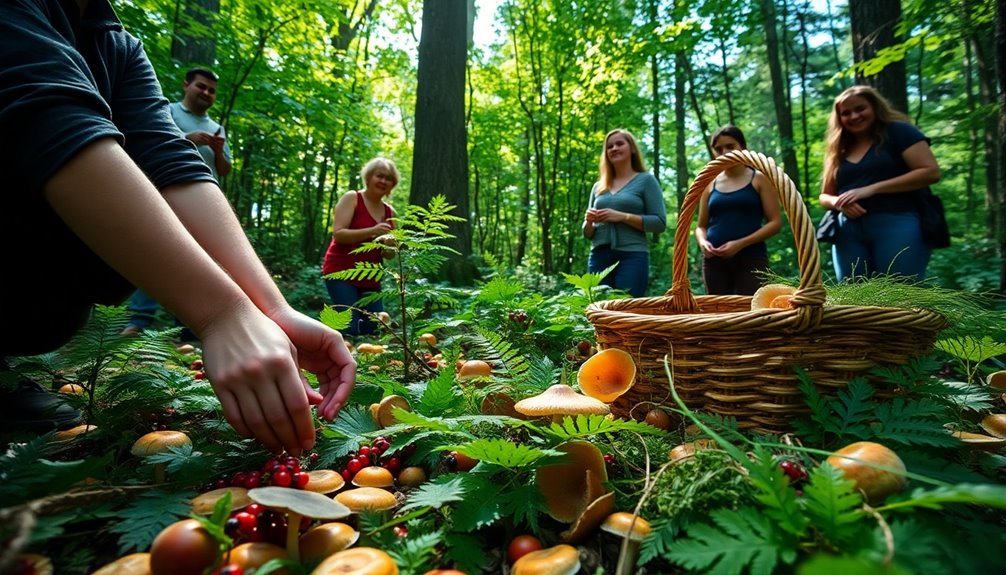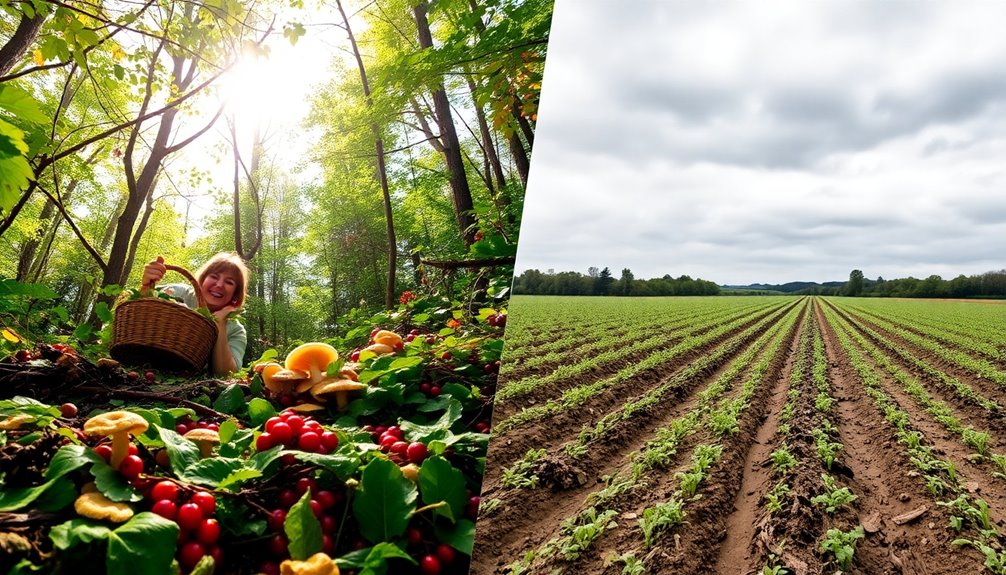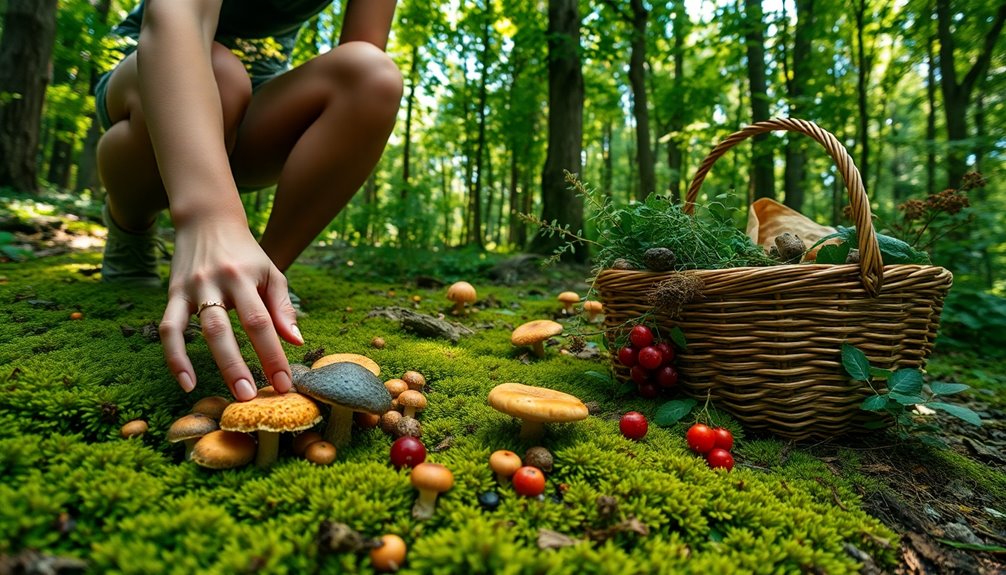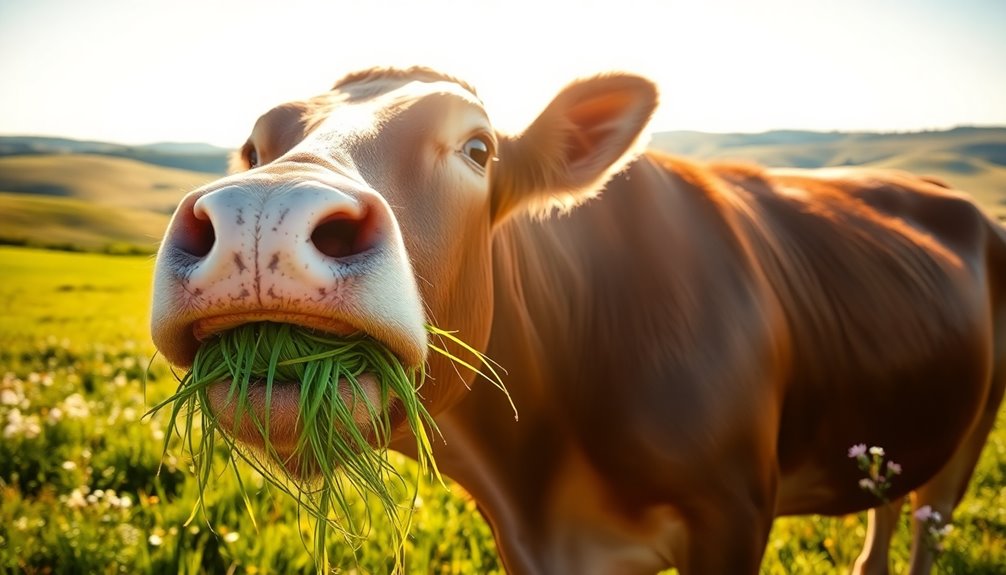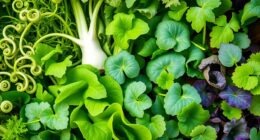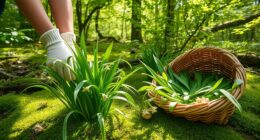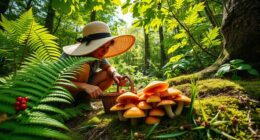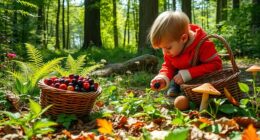A foraging society is a revival of ancient hunter-gatherer practices, where you gather wild edibles to sustain yourself while reconnecting with nature. This ancient lifestyle is making a modern comeback, fueled by a growing interest in sustainable living and local ecosystems. You'll discover an abundance of native plants even in urban areas, thanks to social media and educational workshops that promote foraging. The benefits are plentiful: from boosting your mood and physical activity to strengthening community ties and cultural practices. By embracing foraging, you contribute to both personal well-being and environmental stewardship—there's much more to explore about this fascinating movement!
Key Takeaways
- Foraging societies thrived as hunter-gatherers, relying on wild plants for sustenance before the advent of agriculture.
- The modern foraging movement is fueled by a growing interest in sustainable living and local food sources.
- Foraging promotes physical activity and mental well-being while fostering environmental stewardship and community connections.
- Educational workshops and social media influencers are revitalizing foraging practices and techniques among urban populations.
- Responsible foraging practices ensure sustainable harvesting and preservation of local ecosystems and cultural traditions.
Historical Significance of Foraging
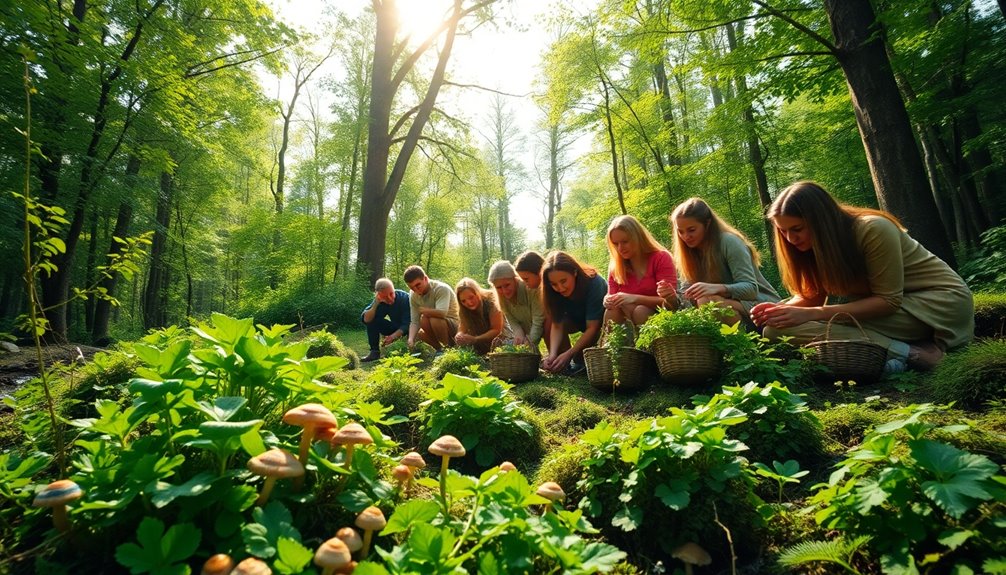
Foraging has shaped human history in ways you mightn't realize. For thousands of years, this practice served as the primary means of sustenance for early hunter-gatherer societies, long before agriculture emerged around 10,000 years ago. By relying heavily on their natural environment, early humans adapted their nomadic lifestyles to align with seasonal food availability, ensuring they could thrive while avoiding predators.
However, the decline of traditional foraging cultures began around 500 years ago, coinciding with the rise of agricultural societies and urbanization. Despite this decline, many indigenous communities have preserved their foraging knowledge and practices, keeping these traditions alive as integral parts of their cultural identity and sustainable living.
Understanding the historical significance of foraging helps you appreciate its role in shaping human survival and adaptability. Today, as you seek to reconnect with nature, you can draw inspiration from the resilience and resourcefulness of those who came before you.
This ancient practice not only nourishes the body but also offers a deeper connection to the earth, reminding us of our roots and the importance of sustainable living in a rapidly changing world.
The Modern Foraging Movement
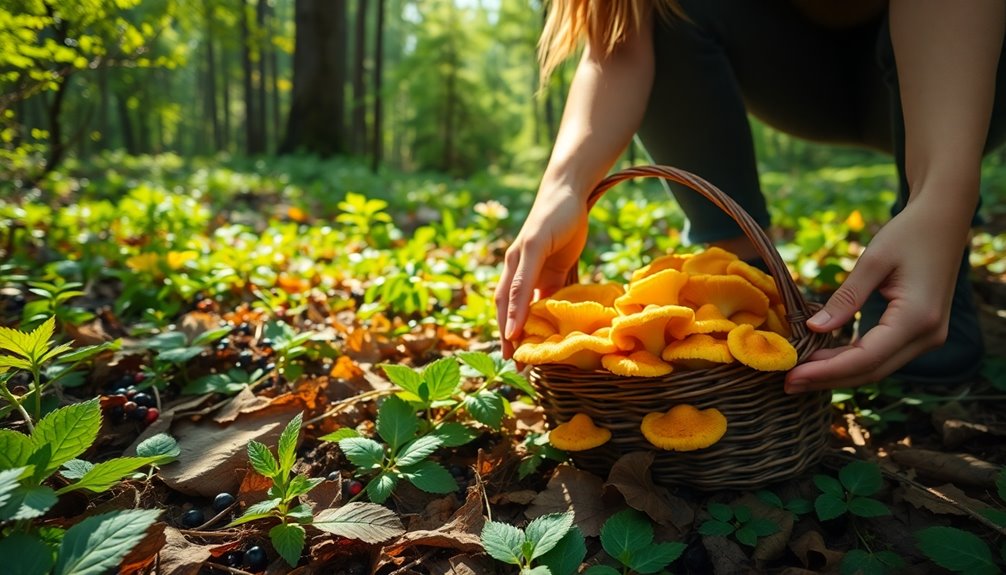
As interest in sustainable living grows, many people are turning back to foraging as a way to reconnect with nature and source fresh food. This modern foraging movement has gained traction, especially in urban areas, where individuals are discovering the abundance of native plants that thrive around them. Additionally, many regions, such as Minnesota's diverse ecosystems, provide a rich variety of wild edibles to explore and enjoy.
With social media influencers sharing foraging techniques and recipes, awareness of this practice is spreading rapidly. Foraging isn't just about finding free food; it also plays an essential role in promoting sustainable practices. By harvesting local flora responsibly, you can help control invasive species that threaten biodiversity.
Engaging in foraging activities fosters a deeper connection to your local ecosystem, encouraging you to appreciate the native plants that enrich your environment. Master Mushroom Foraging Secrets provide valuable insights into successful foraging strategies, enhancing your overall experience. Educational initiatives are popping up everywhere, offering workshops and community events to teach you about the benefits of foraging.
As you explore your surroundings and learn to identify edible plants, you'll develop a greater understanding of how to live sustainably. The resurgence of foraging reflects a growing desire for self-sufficiency, making it a relevant and significant aspect of today's lifestyle.
Benefits of Foraging
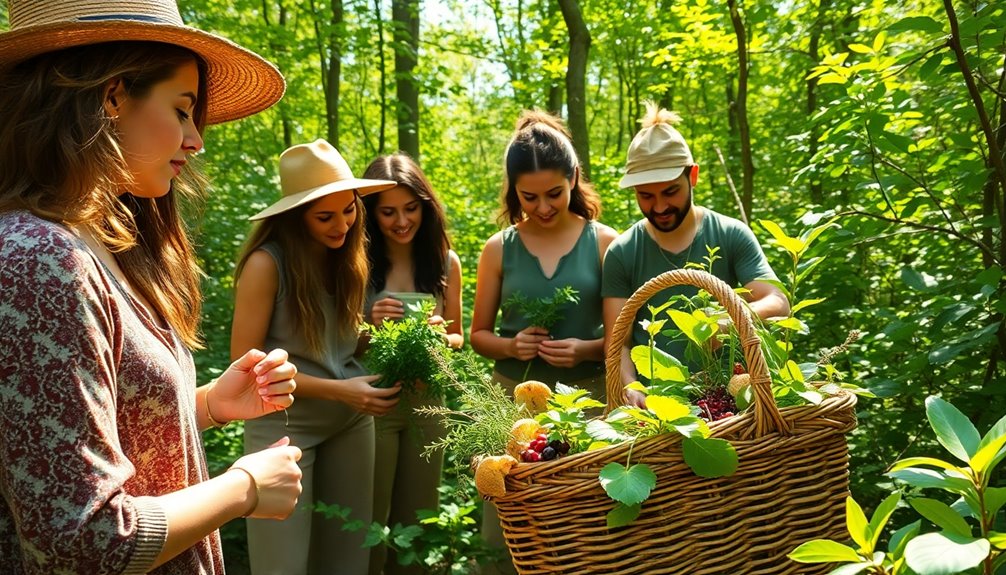
While many people seek ways to enhance their well-being, foraging offers numerous benefits that extend beyond just gathering food. Engaging in foraging activities promotes physical activity, encouraging you to move outdoors and connect with the natural world. This low-impact movement contributes positively to your overall physical health, making it a great way to stay active.
Additionally, spending time in nature while foraging has been shown to alleviate stress, anxiety, and depression, enhancing your mental well-being. The sense of accomplishment you feel from successfully identifying and collecting wild edibles can boost your self-esteem and provide a therapeutic escape from our fast-paced, technology-driven lives.
Foraging also provides access to fresh, free food sources, allowing you to connect with sustainable food systems and improve your diet. By understanding local ecosystems and biodiversity, you foster a deeper appreciation for the environment, promoting a sense of stewardship and responsibility.
Safety and Sustainability Practices

Engaging in foraging can be incredibly rewarding, but it's important to approach this practice with a focus on safety and sustainability. First and foremost, you need to verify the identity of wild plants before consuming them. Incorrect identification can lead to serious health risks, so always double-check.
It's wise to start with small portions of foraged foods to test for allergies and guarantee safe consumption.
Sustainability is equally essential. When foraging, practice responsible harvesting by leaving some plants behind. This helps maintain healthy populations and promotes biodiversity in natural ecosystems.
Collaborating with local guides or experts can enhance your knowledge of safe foraging techniques and proper processing methods, ensuring you're making informed choices.
Be aware of geotagging locations when sharing your foraging finds. Overcrowding can degrade foraging sites, threatening the sustainability of the plant populations you cherish.
Community and Cultural Impact
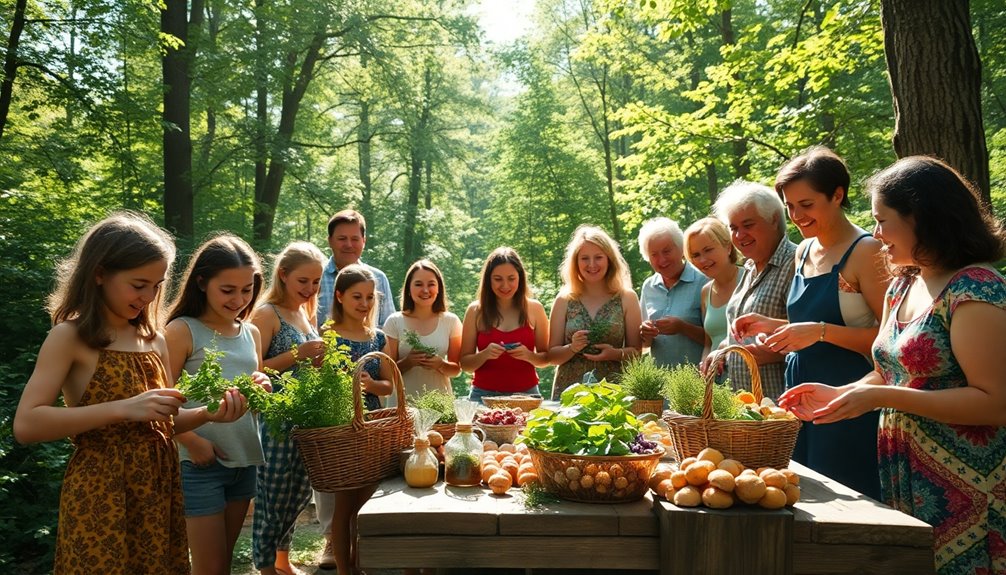
Foraging creates vibrant community connections that strengthen social bonds and foster support among members. By engaging in foraging activities, you not only learn about local plants but also participate in a rich tapestry of cultural traditions. This practice enhances social cohesion, as food sharing and collective resource management unite individuals around shared goals and values.
Here's how foraging impacts communities:
- Cultural Exchange: Modern foraging movements celebrate diverse traditions, enhancing appreciation for indigenous practices.
- Education and Awareness: Foraging activities teach sustainable practices and promote biodiversity conservation, connecting you to local ecosystems.
- Community Resilience: During crises like the COVID-19 pandemic, foraging networks provided essential support, showcasing the strength of community solidarity.
In essence, the resurgence of foraging nurtures both individual knowledge and collective action, making it a powerful tool for reinforcing community ties.
As you embrace this ancient lifestyle, you're not just foraging for food; you're enriching your community and preserving cultural identity, ensuring that crucial ecological knowledge continues to thrive for generations to come.
Frequently Asked Questions
What Is the Meaning of Foraging Society?
A foraging society refers to a community that survives by gathering wild plants, fruits, and hunting animals instead of relying on agriculture.
In these societies, you'll find small groups working together, emphasizing equality and shared resources. You engage in a lifestyle that adapts to nature's cycles, often moving to guarantee access to food.
The division of labor typically sees men hunting and women gathering, reflecting the environmental needs and social roles within the group.
Do Foraging Societies Exist Today?
You'll find that foraging societies still thrive today, though they've adapted to modern pressures.
These groups, often seen as living echoes of a simpler time, include indigenous communities like the San Bushmen and Hadza.
While their traditional practices may face challenges from modernization, many urban enthusiasts are rediscovering the art of gathering wild edibles.
This blend of ancient skills and contemporary life sparks a renewed interest in sustainable living and cultural preservation.
What Does Foraging Mean in World History?
Foraging in world history means relying on nature's bounty for sustenance, shaping human survival for millennia.
You'd gather wild plants, hunt animals, and adapt to local ecosystems, creating rich cultural practices. This lifestyle influenced social structures and community bonds, fostering cooperation and shared knowledge.
As agricultural societies emerged, traditional foraging declined, but its legacy persists.
Today, many seek to reconnect with these ancient practices, emphasizing sustainability and deeper environmental awareness in their lives.
What Was the Foraging Lifestyle Required?
Did you know foragers spent only 5-6 hours a day acquiring food? This lifestyle required constant movement to find seasonal resources while avoiding predators.
You adapted to local ecosystems, gathering wild plants and hunting animals, ensuring a balance between community needs and environmental health.
Your social structures fostered cooperation, with distinct roles where men typically hunted and women gathered. This egalitarian approach allowed for ample leisure time, encouraging socializing and cultural expression.
Conclusion
In embracing foraging, you tap into a rich history while reconnecting with nature. This ancient lifestyle isn't just about survival; it's a vibrant movement that promotes wellness, sustainability, and community. Picture yourself wandering through a forest, gathering wild edibles, and sharing your finds with friends. By adopting foraging, you're not just honoring the past; you're cultivating a deeper appreciation for the environment and fostering a sense of belonging in a world that often feels disconnected.

